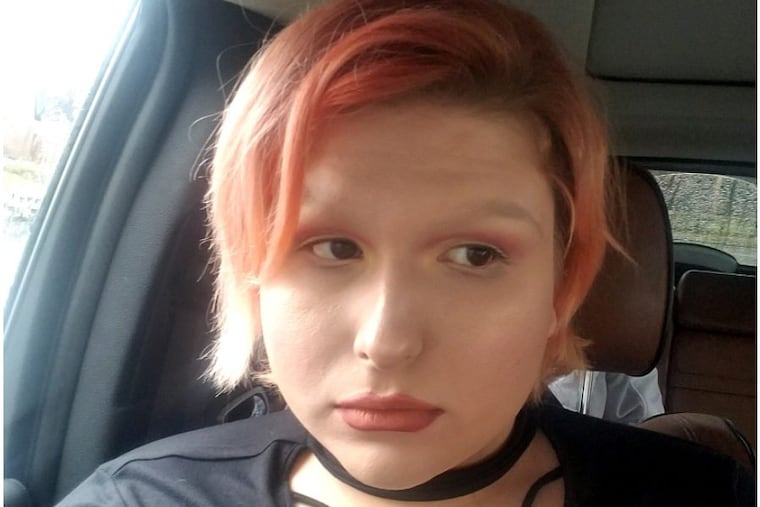Transgender woman sent to men’s prison in Philadelphia: Experience was ‘dehumanizing’
"Police are actively and brutally misgendering and mistreating queer people in the system," ReeAnna Segin said.

A transgender woman accused of trying to burn a flag in a crowd at Philadelphia's Pride parade says authorities referred to her by male pronouns, used her birth name, Ryan — even though she told them it was her "dead name" and she goes by ReeAnna — and ignored her pleas not to be housed with male inmates.
"Aside from the constant fear of danger, it was very dehumanizing and invalidating as a woman," ReeAnna Segin told the Inquirer and Daily News on Monday.
Segin's arrest and incarceration have raised questions of how authorities treat transgender suspects. Police have said they publicly identified Segin as "Ryan" because she gave them only that name, but Segin said she provided both that and her current name. (Police also said Segin was 18; she is 20.)
"I made it clear I don't go by my dead name anymore," she said. "That was ignored both by the police making the statements to the press, as well as the police in the prison and jail."
The Police Department declined to comment Monday. The District Attorney's Office last week dropped felony charges of attempted arson and risking a catastrophe but said Segin still faces misdemeanor charges of recklessly endangering another person and possessing an instrument of crime. A rally is being held Wednesday outside City Hall to pressure the office to drop those charges, too.
Although flag burning is not illegal, police said that Segin tried to do it amid a crowd and that she had road flares and paint thinner in her backpack. Segin said that the flag, which had black and white stripes along with a blue stripe, was a Blue Lives Matter flag and that she was protesting the presence of police at Pride.
"A lot of people don't realize that cops have historically arrested and assaulted queer people, and they still treat LGBTQ people so horribly through their system," Segin said. "Police can never be seen as part of a safe environment for Pride if police are actively and brutally misgendering and mistreating queer people in the system."
After her arrest at the June 10 parade, Segin was placed in a single-occupancy cell at Philadelphia Police Headquarters — the department's policy is to hold transgender arrestees in single-occupancy cells "whenever practical" — before officers took her the next morning to the Curran-Fromhold Correctional Facility, a men's prison.
Segin said she felt in danger in the prison because transgender people face a high risk of assault while incarcerated. (Nearly 30 percent of transgender individuals held in jails, prisons, or juvenile detention centers reported that staff or other inmates had physically or sexually assaulted them in the last year in a 2015 survey by the National Center for Transgender Equality.)
"The majority of the time I was with other inmates, despite having made it clear that that was not safe for me," Segin said. Some of that time was in a holding cell with several men, she said. She was also placed in a single holding cell after raising concerns about her safety, she said.
>> Read more: Why a transgender woman was sent to a men's prison in Philadelphia
Segin was in the prison for about eight hours, she said, before the city's LGBT affairs director, Amber Hikes, and activists helped bail her out.
For the sake of transparency: Yesterday at the beginning of the Pride parade, a trans woman was arrested at 12th and…
Posted by Amber Hikes on Monday, June 11, 2018
"I am deeply pained to hear what ReeAnna experienced last week," Hikes said Monday. She said her office was working to "ensure everyone, regardless of sexuality or gender identity, can navigate within these systems with a sense of dignity and safety."
The Prisons Department defended how it processed and housed Segin.
"The Department of Prisons works to ensure the safety and security of everyone committed to our care," spokesperson Shawn Hawes said. "In this instance, the PDP's procedures were properly performed in accordance with established policies during all points of incarceration, from intake throughout the release process."
The department generally houses inmates in a facility matching the gender listed on their ID, unless they have had gender-reassignment surgery. Police use a similar system to decide which gender to classify a person.
Surgery, however, isn't required to identify as transgender, which means identifying with a gender different from the one with which a person was born.
"I think the issue isn't whether or not I had any surgeries," Segin said, "but why the police make that matter."
Segin's arrest and incarceration drew outcry from activist groups such as Philly Socialists and Philly for REAL Justice, which asked people to donate to help her post bail. Segin said she has been grateful for the support.
Reposted from Philly SocialistsA trans comrade was detained during Pride for allegedly setting fire to a flag….
Posted by Philly for REAL Justice on Sunday, June 10, 2018